
College of Arts and Sciences
June 1, 2023
Mo Briare ’92, ’04 has been a nurse, a musician, and a composer of sacred music. Now she’s teaching nursing students to use music for the health of their patients and for their own health, too.
Story by Jessica Murphy Moo
Photos by Ben Sellon
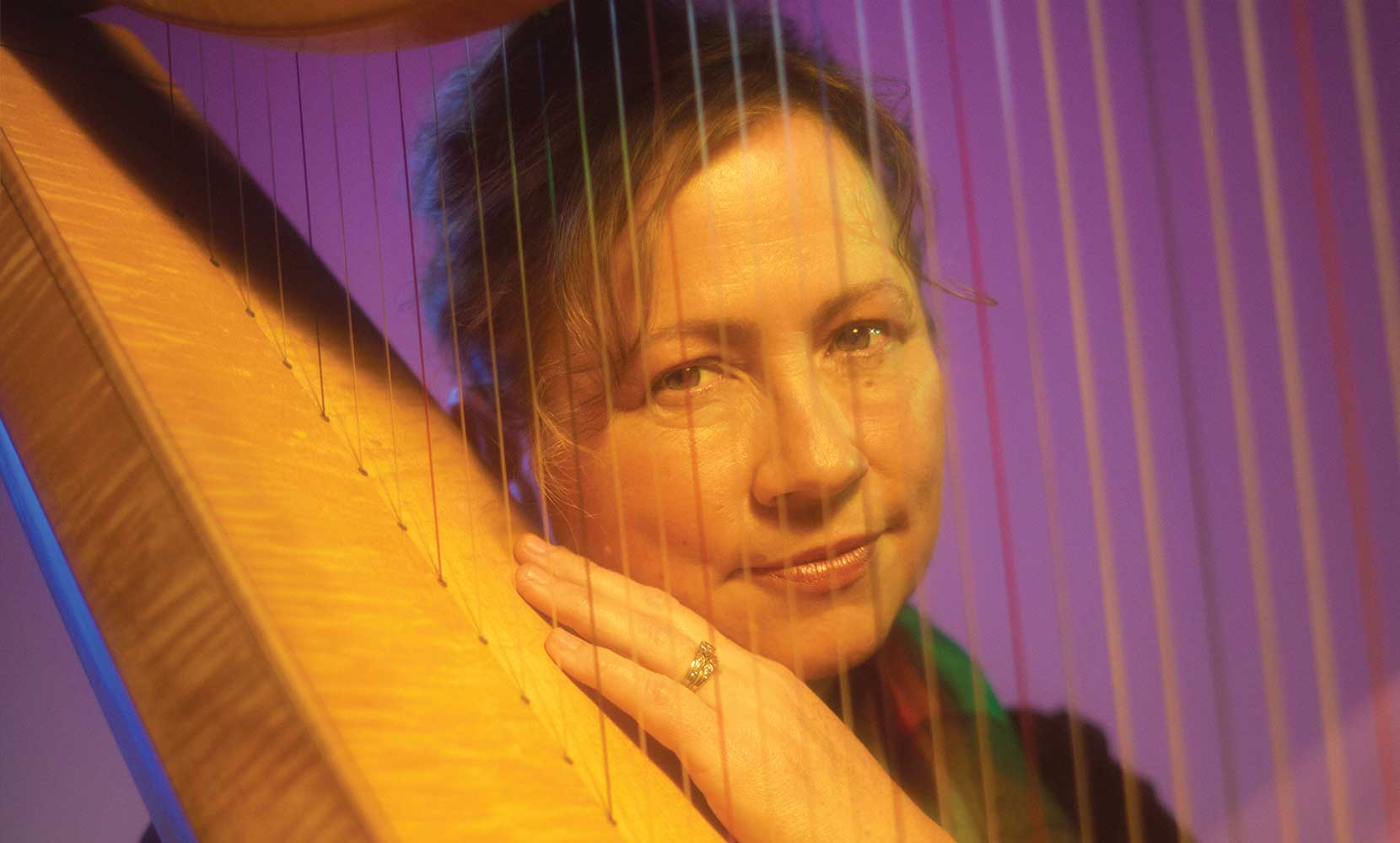
MAUREEN “MO” BRIARE starts most of her nursing classes seated at her Celtic harp. As students enter the room and take their seats, she pulls the instrument close to her heart, lays her fingers on the strings, and plays. Sometimes a recognizable melody emerges—a Beatles tune, some Bill Withers, a hymn—and sometimes the music is her own original composition. She likes to change it up.
The music has a notable effect on the room. Scattered conversations wrap up, replaced by a still attention. She asks the students to take some deep breaths, she finishes the final song, and then, with everyone a bit calmer, Mo and the students in purple scrubs get down to business.
The day I visited, she was teaching students about how nurses can use all five senses—theirs and the patient’s—during a health assessment. When the discussion turned to our sense of hearing, how it develops before we’re born, what part of the brain it’s connected with, how it can be tied to memory, how to conduct an ear exam, it wasn’t surprising that the nurse-harpist-instructor also mentioned that “music can be a powerful tool of healing.”
Mo wants her students—and everyone, really—to know that music is good for your health and well-being. It’s good for your mind, it’s good for your heart, it’s good for your spirit—the whole shebang. She’s known this intuitively for most of her life. Now that she’s teaching in UP’s School of Nursing & Health Innovations and working toward her doctorate in neuroeducation, she is armed with a burgeoning body of scientific research to support her intuition. And she’s seeing two aspects of her life’s work—health and music—come together in sharp focus.
“My goal is to get healing harp music into hospitals and care facilities in the US health system,” she said. “That’s my lofty goal.”
She also wants her nursing students to have tools to take care of themselves—now and as they navigate an important and often stressful career.
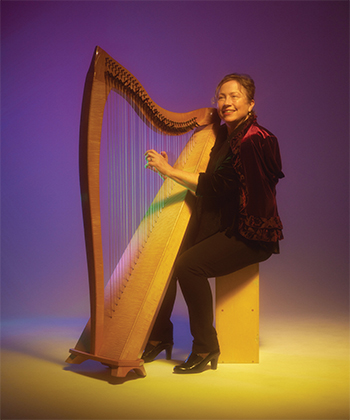 That music has a positive effect on our minds and our overall well-being is not a new idea. Look to ancient healing practices and you’ll find music embedded in traditions around the world. In the Western tradition, the Greek physician Hippocrates—namesake of the Hippocratic oath and often considered Western medicine’s first clinician—played music for his patients suffering from mental illness. Today there are surgeons who prescribe music postop to aid patients in pain management and healing.
That music has a positive effect on our minds and our overall well-being is not a new idea. Look to ancient healing practices and you’ll find music embedded in traditions around the world. In the Western tradition, the Greek physician Hippocrates—namesake of the Hippocratic oath and often considered Western medicine’s first clinician—played music for his patients suffering from mental illness. Today there are surgeons who prescribe music postop to aid patients in pain management and healing.
Over the past 10 years the field of music therapy has grown by leaps and bounds. Many hospitals now hire music therapists to play in neonatal intensive care units to provide soothing sounds and safe stimulation for those brand-new brains. (Mo likes to imagine the kind of healing that might happen in hospitals if soothing music replaced all of the harsh, mechanical beeps.) Music therapy has aided individuals who suffered a stroke or a brain injury to regain function. (Former Arizona Congresswoman Gabby Giffords, for example, worked with a music therapist to recover her ability to speak after a gunshot wound took that ability from her.) Music therapists often work with individuals with autism, PTSD, chronic pain, and dementia.
Today scientists—neuroscientists in particular— are aiming to figure out the why and the how. How exactly is it that music can assist in the movement of someone who has Parkinson’s disease? How does music lower blood pressure, help with pain management, and memory? How might scientists harness these findings for, say, the treatment of those who have Alzheimer’s disease? Partnerships between schools of medicine and schools of music are popping up at institutions of higher education across the US. The Johns Hopkins Center for Music and Medicine is one example. UP’s School of Nursing & Health Innovations has a new Integrative Health and Wellness major, which is cross-listing a class taught by a faculty member from the Music Department.
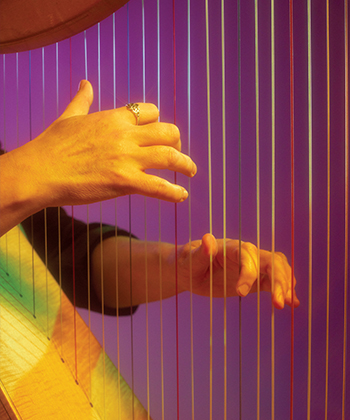 Kelly Fox, who teaches in the School of Nursing & Health Innovations, has seen the effects of Mo’s music on clients, and she has felt the benefit herself as a caregiver.
Kelly Fox, who teaches in the School of Nursing & Health Innovations, has seen the effects of Mo’s music on clients, and she has felt the benefit herself as a caregiver.
Once a month, the nurse clinic at the Blanchet House of Hospitality holds a Foot Care Clinic. Kelly and at least four other UP nurses—professors, alums, and student nurses—spend about three or four hours washing and caring for the feet of the houseless or residents at the Blanchet House. This is intense work, sacred work. Vulnerability-level is high. Nurses need to be humble, highly skilled, and deeply attuned to people’s needs, often unspoken. This population of individuals spends a lot of time on their feet in harsh conditions. Their trauma or untreated frostbite or lack of access to hygiene can show up in their feet.
For each of the Foot Care Clinics, the nurses and volunteers set out five Adirondack chairs in a circle, a basin at the foot of each chair, a chocolate snack and a water bottle off to the side. The final touch to make it a special, healing space? Mo plays her harp for three hours straight. (She says she doesn’t really have fingerprints anymore, just callouses.)
The nurses see as many people as they can fit into the three-hour session. Sometimes a guest is in and out of that chair in 20 minutes; sometimes a session can go for close to an hour. Trust can take time. Sometimes people let their emotions out. Sometimes they start to smile. I saw one man doze off with his Chihuahua snoozing on his chest. Another individual was reluctant to part with his shoes. Everyone has the option to leave with a fresh pair of socks and sneakers.
The expertise and humility of the nurses makes this operation work, but Kelly also sees the music playing a big part. “They feel the beauty of that music,” Kelly said. “You see their shoulders relax. You see their eyes close. You see their breathing decrease and their anxieties go down. You see the transformation of an individual.” And the care providers feel the same calming effect. “As soon as Mo starts playing, I feel my shoulders go down. I feel my breathing decrease. I feel that everything is going to be ok.”
And the music can also spark joy and connection. Guests have been known to sing along or request a song. Mo was once asked if she knew any James Brown. I have no idea what “I Feel Good” would sound like on the harp, but she delivered. One guest approached her and put a dollar bill in her harp bag, a gesture and a gift that touched her deeply. It reminded her of the “Widow’s Mite” story in the New Testament, and she saw it as a sign to keep going.
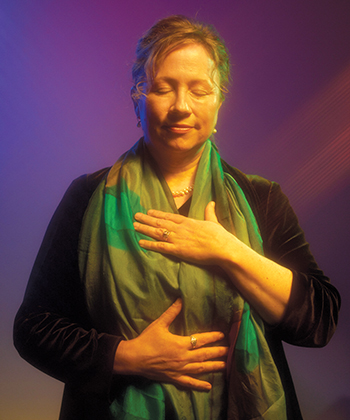 Mo sees her work and her music through a spiritual lens. A person of deep faith, she believes her music and faith are inextricably linked. She grew up in the Catholic Church, and in many ways she grew up at University of Portland. And if you are a person of faith, after meeting Mo and witnessing her in action, it’s not a stretch to think God is working through her. She told me that a former student of hers who is now an ICU nurse once said to her, “Mo, the Holy Spirit follows you around like a dog.”
Mo sees her work and her music through a spiritual lens. A person of deep faith, she believes her music and faith are inextricably linked. She grew up in the Catholic Church, and in many ways she grew up at University of Portland. And if you are a person of faith, after meeting Mo and witnessing her in action, it’s not a stretch to think God is working through her. She told me that a former student of hers who is now an ICU nurse once said to her, “Mo, the Holy Spirit follows you around like a dog.”
Sr. Rebecca Mary at Holy Cross Elementary School in North Portland put a guitar in 10-year-old Mo’s hands and taught her a few chords. That was enough for Mo to start playing for the school Mass. In some ways Mo just never stopped. (She still leads the liturgical music at Holy Cross Parish on Saturdays.) She was involved in campus ministry at UP when she was an undergrad, and where she majored in nursing and minored in music (three cheers for the liberal arts education setting someone on a fulfilling path). When she was a hospice nurse, she would sometimes play her harp as a patient was dying. In one of those sessions, she says, she felt a divine presence in the room.
For the past 20 years she has played the harp for Thursday Mass for the UP priests and brothers here on campus. She took some time away from nursing care for a while and became the director of liturgical music in UP’s Chapel of Christ the teacher, earned her master’s in music composition, and started composing and publishing her own sacred music.
Watching Mo conduct a choir of staff, faculty, and students during a Mass is something to behold. I’m told that just before the start, after a never-enough-time rehearsal, she claps her hands and says, “It’s Holy Spirit time,” and then she runs with it, with all the verve and panache she’s got.
Her philosophy: “You can’t be just tepid and indecisive. You’ve got to go whole heart, 100 percent.”
And does she ever. You might glance over and see Mo playing guitar, then the next time you look back she might be at her harp, or the piano, or the flute, the bells, or the conga drums. She might be singing. If she’s conducting, she’s throwing her whole body into it.
Watching Mo in action, I often ask how she does it all. How does she maintain such a fruitful, multifaceted career while raising six children with her husband? And while it might not be possible to answer that question—her pace may be one of the mysteries of the universe—it’s clear that she does it all with joy.
And it’s clear she inspires the same in her students. When I met Mo in the Pilot House for an interview, we were (happily) interrupted by several nursing students popping by to say hello. Afterward, as we left the building—Mo carrying her harp in a gigantic black bag nearly her size—a handful of students greeted her with a “Mo!” and a hug. She’s a bit of a magnet.
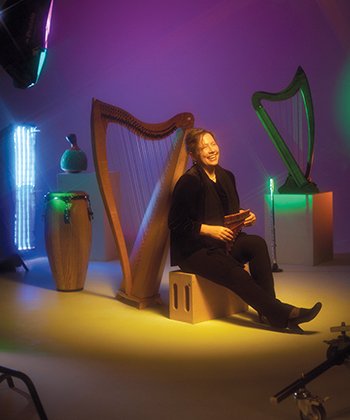 On Tuesdays, Mo is the nurse on site at the Harrington Health Clinic, which offers comprehensive nursing care to residents of the Blanchet House.
On Tuesdays, Mo is the nurse on site at the Harrington Health Clinic, which offers comprehensive nursing care to residents of the Blanchet House.
Andy Abeyta, a residential program manager there, summed up Mo succinctly. “She has a great vibe,” he said. “If you’re feeling down, and you talk to her, you’ll feel better.”
This semester, nursing student Lauren Sloan ’23 spends her Tuesdays with Mo. Lauren says she’s learned from Mo “how to be a nurse and how to be an advocate.” She considers Mo to be a role model. “She’s made me realize I’m capable. I’ve never met anyone like her.”
During the lunch hour—as you may have guessed—Mo plays her harp. The day I joined them she got a round of applause at the end of the hour, after they finished serving more than 200 meals. As people started to finish up the lunch hour, a man approached her. I didn’t hear what their conversation was about. That was for them. But I saw her hold out the harp, and I saw the man reach out and run his fingers down the strings. There was an openness and a tenderness in the exchange.
Then someone on staff tapped her on the shoulder; there was a client waiting for her in the clinic—and, just like that, she was off to where she was needed most.
JESSICA MURPHY MOO is the editor of Portland magazine.
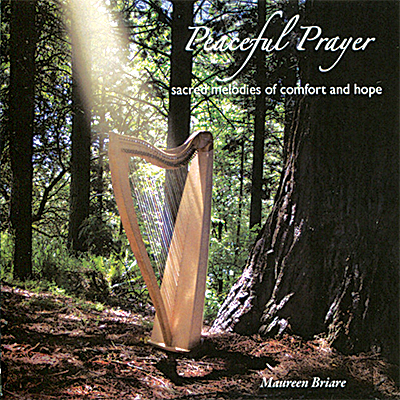 Mo has composed something of a soundtrack for University of Portland. She wrote “We Will Rise,” a gospel-influenced song for singer Julianne Johnson, to mark the outset of UP’s Rise Campaign in 2010, which successfully raised more than $180 million. She wrote a string quintet for a longtime music professor and choral director, Roger Doyle—who later requested that this piece be played at his funeral. “To the Ends of the Earth,” written for a UP Baccalaureate Mass, drew inspiration from the illuminations of The St. John’s Bible, a copy of which is housed at Clark Library. In 2018, she wrote a song in Kiswahili to sing—with UP students—as a thank you to the hosts of a student immersion experience with the Moreau Center for Service and Justice in Tanzania. (They performed the song “Asante,” which means “thank you,” everywhere they went. They even ended up singing it with a local choir and in front of hundreds—and on a television station!—during a visit by the local bishop.)
Mo has composed something of a soundtrack for University of Portland. She wrote “We Will Rise,” a gospel-influenced song for singer Julianne Johnson, to mark the outset of UP’s Rise Campaign in 2010, which successfully raised more than $180 million. She wrote a string quintet for a longtime music professor and choral director, Roger Doyle—who later requested that this piece be played at his funeral. “To the Ends of the Earth,” written for a UP Baccalaureate Mass, drew inspiration from the illuminations of The St. John’s Bible, a copy of which is housed at Clark Library. In 2018, she wrote a song in Kiswahili to sing—with UP students—as a thank you to the hosts of a student immersion experience with the Moreau Center for Service and Justice in Tanzania. (They performed the song “Asante,” which means “thank you,” everywhere they went. They even ended up singing it with a local choir and in front of hundreds—and on a television station!—during a visit by the local bishop.)
Take a moment, take a break, and listen to some of Mo’s compositions on her album Peaceful Prayer: Sacred Melodies of Comfort and Hope (up.edu/peacefulprayer) or The Road of Mercy (up.edu/roadofmercy). You can find more of her music on her website: musicbymo.com
University of Portland
5000 N. Willamette Blvd.,
Portland, Oregon 97203-5798
503.943.8000
This website uses cookies to track information for analytics purposes. You can view the full University of Portland privacy policy for more information.
